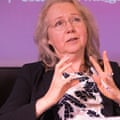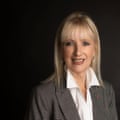
This year as always, our panel of judges bring a hugely impressive range of expertise to the Guardian Public Service Awards. They include Guardian staff and public service experts with in-depth knowledge of local and central government and private and not-for-profit organisations.
Polly Toynbee, Guardian columnist
Polly Toynbee is a columnist for the Guardian. She was formerly BBC social affairs editor. and is chair of the Brighton Festival.
Her books include Dismembered: How the Attack on the State Harms Us All, co-authored with David Walker.
David Brindle, public services editor, the Guardian
David Brindle is the Guardian’s public services editor. He has been with the Guardian since 1988, first as social services correspondent and then as editor of Society Guardian.

Brindle has won awards for his coverage of social services, mental health, nursing and disability issues. He is chair of social inclusion charity NDTi and non-executive director of the Recovery Focus Group of charities. He is vice chair of the Recovery Focus group and served for nine years on the board of Housing 21, a housing and care provider for older people.
Jane Dudman, Guardian public leaders editor

Jane Dudman is the Guardian’s public leaders editor, writing and commissioning articles on public leadership and policy, with a particular interest in women’s issues, local and central government, and the role of voluntary organisations in delivering public services. She is part of the team who compile the weekly Society newsletter.
Formerly a freelance business journalist, Dudman has worked at the Guardian since 2007, first as associate editor of Public magazine, then as editor of the public leaders, housing and voluntary sector networks.

Patrick Butler, social policy editor, the Guardian
Patrick Butler is the Guardian’s social policy editor and was previously editor of Society Guardian, the Guardian’s weekly social affairs supplement.
Butler has been a Guardian journalist for more than 20 years and has written extensively about welfare reform and the impact of government cuts on public services.

Alison Benjamin, editor, Society Guardian
Alison Benjamin is the editor of the Guardian’s Society pages and deputy editor, Opinion. She has been a journalist at the Guardian for more than 15 years and specialises in social affairs and comment.
She is also the co-author of three best-selling books about bees: A World Without Bees, Bees in the City: an urban beekeepers’ handbook and Keeping Bees and Making Honey

Clare Horton, Society Guardian online editor
Clare Horton is the Society online editor. She has been a journalist at the Guardian for almost 18 years and is part of the team who compile the weekly Society newsletter.
Horton previously edited the Guardian’s networks for health and social care professionals, and compiled the Society briefing bulletin.
Sarah Johnson, Society Guardian online commissioning editor

Sarah Johnson is a commissioning editor at the Guardian. She set up and continues to edit the Blood, sweat and tears series, which features first-person accounts of working in, and receiving, healthcare. The Guardian’s healthcare professionals network, for which Johnson commissioned and edited content until June 2018, was shortlisted for publication of the year in Mind’s prestigious 2017 awards.
Johnson is also a writer, specialising in mental health and other aspects of healthcare in the UK and abroad. She has been a journalist at the Guardian for five years, after starting her career in Vietnam where she was based for two and a half years.

Clare Allan, writer, author and lecturer
Clare Allan is a writer and author of the novel Poppy Shakespeare. She lectures in creative writing at City University London.
A user of mental health services, Allan has written a column for the Guardian on matters relating to mental health for the past 10 years.

Sharon Allen, chief executive, Skills for Care
Sharon Allen has worked in the public and voluntary sector, social care and supported housing sectors for more than 30 years. A qualified social worker and housing professional, Allen became chief executive of Skills for Care in 2010, having previously been chief executive of a large social care and supported housing organisation.
She is a member of the Think Local Act Personal programme board and chairs the operations committee of the CHS Group housing association in Cambridge. She is also on the board of Age UK and was awarded an OBE in June 2015 for services to social care, homeless people and housing.
Helen Backus, Guardian Public Servant of the Year 2016

Helen Backus is a commissioning manager for Buckinghamshire county council. Her background includes work in the charity sector and 10 years in the military. Her experience includes strategic commissioning, establishing and maintaining services for vulnerable children and young people, linked hospital and community provisions for older vulnerable people and specialist linked housing for students with higher needs in communities.
She is also a member of the all-party parliamentary group for autism and the all-party parliamentary group for learning disabilities.
Alicia Barnes, founder and chief executive, Our Sorority

Alicia Barnes is a social entrepreneur and practitioner, working to change the way public services in Birmingham work with the most vulnerable young women and their families. Barnes set up Our Sorority based on her own experience of disadvantage, including interacting with public services once she had left care.
Our Sorority delivers support to extremely vulnerable young women in crisis and also trains professionals in other services with which the women interact. Since 2015, Barnes and her team have trained staff in West Midlands jobcentres to identify and respond appropriately to vulnerable young women seeking benefits.
In 2017 Our Sorority started running sessions in secondary schools in the West Midlands to alert teachers and students to child sexual exploitation and how to respond once it is identified.
Sue Bott, deputy chief executive, Disability Rights UK

Sue Bott, a disabled person with visual impairment from birth, has been active in the disability movement in the UK for many years. She is deputy chief executive at Disability Rights UK, a merger of the National Centre for Independent Living, of which she was chief executive, Disability Alliance and Radar.
Previous to that Bott spent 15 years working for Shropshire Disability Consortium, a centre for independent living, initially as its development worker and latterly as its chief officer. She has a first degree in political theory and institutions and a masters degree in public service management. She was awarded a CBE in 2014 for services to disabled people and their families.
Dwayne Branch, director, London borough of Newham

As a director within the financial sustainability team, Dwayne Branch leads a team of commercial project managers and consultants working to deliver income and/or savings to make Newham more resilient to external funding cuts.
After 10 years as a consultant, Branch moved to the public sector to help deliver difficult change and ambitious commercial programmes, using his experience from his work with various clients. The team is responsible for a wide range of projects, including sourcing and evaluating new opportunities.
Chris Catterall, chief executive, Capacity: the Public Services Lab

Chris Catterall has spent the past 10 years working in Liverpool’s social sector and is the first chief executive of Capacity: the Public Services Lab, an organisation changing the way public services are delivered in Merseyside.
Catterall brings expertise in facilitating collaboration and innovation between charities, communities and commissioners to redesign public service commissioning and engage communities in Merseyside and beyond to play a bigger part in delivering public services.
Jessica Crowe, assistant director of customers, commissioning and governance, London borough of Sutton

Jessica Crowe and her team are responsible for leading and delivering the council’s ambitious agenda of outcomes-based commissioning, transformation and public sector reform. She is also responsible for Sutton and Kingston’s shared customer service.
Prior to joining Sutton, Crowe was executive director for eight years of the Centre for Public Scrutiny. She is nationally recognised for her expertise in good governance, having been appointed by both the UK and Welsh governments to statutory intervention and improvement roles. Crowe was previously an elected member in the London borough of Hackney, where she was deputy to the elected mayor. She has also worked in central government and for local government organisations including the Local Government Association, the Greater London Authority and the Local Government Information Unit.
Clenton Farquharson, chair, Think Local Act Personal partnership board

Clenton Farquharson, who chairs the Think Local Act Personal programme board, works as a consultant, auditor, trainer and coach on inclusion, equality and disability, and was named in Disability News Services’ list of influential disabled people.
An expert on co-production and disability rights, Farquharson combines theoretical knowledge and training with personal experience and practical insights. He is a trustee of Lench’s Trust, an almshouse charity, and the learning disability rights charity Change. He is also a director of Community Navigator Services CIC and a Skills for Care Ambassador. In 2014 he received an MBE in recognition of his services to people with disabilities.
Piali Das Gupta, head of policy, Solace

Piali Das Gupta is head of policy at the Society of Local Authority Chief Executives and Senior Managers (Solace).
Prior to joining Solace, she was assistant chief executive at Birmingham city council and a senior adviser on the policy team at the Local Government Association. She also previously held senior posts with the government of Canada.
Anthony Douglas, chief executive, Cafcass

Since 2004, Anthony Douglas has been chief executive of Cafcass, the national agency charged with articulating the voice of the child in family courts throughout England. Cafcass employs the highest number of social workers of any UK organisation and is responsible for 140,000 children annually.
Douglas, who steps down from his post in March, was an economist
and a journalist before becoming a social worker and has written four books on UK social care, and is now writing a fifth, on resilience in global societies. He is a visiting fellow of the Universities of East Anglia and Plymouth and is a member of the Family Justice Board and the Adoption Leadership Board. He was awarded a CBE in 2008 for services to family justice and adoption and was made an honorary doctor of law by the University of East Anglia in 2018.
Sarah Ellson, head of regulatory law, Fieldfisher

Sarah Ellson has 18 years of experience in regulatory law particularly in healthcare and life sciences, working largely for public sector clients such as regulatory bodies.
She is at the forefront of legislative change and during 2017 has been involved in considering how Brexit and funding challenges will affect the professional workforce in the UK.
Peter Fleming, leader, Sevenoaks district council

Peter Fleming is leader of Sevenoaks district council and a deputy chair and national spokesperson for the Local Government Association.
Multi-award-winning Sevenoaks is the first council in England to become self-sufficient from direct government funding. The council runs a 10-year rolling budget, keeps services in-house and uses property to support services and the priorities of its residents.
Fleming is a strong advocate that innovation with a revolutionary zeal, rather than evolution, is the only hope for the future of local public services and that there is no better time than now to instigate significant change.
Glen Garrod, president, Association of Directors of Adult Social Services

Glen Garrod joined Lincolnshire county council in March 2012. His role was expanded in October 2016 to include public health, when he became the executive director of adult care and community wellbeing. He chairs the Lincolnshire task group that produces the Lincolnshire better care fund.
Garrod’s background is in clinical psychology, , social work and applied research. He also has an MBA. Garrod has worked in Scotland, Wales, England, India and the US and has studied health and social care in New Zealand.
Garrod was the East Midlands branch chair for the Association of Directors of Adult Social Services (Adass) from 2015 to March 2017, when he became the organisation’s vice-president. He became president in April.
Baroness Olly Grender

Olly Grender’s career has spanned the world of politics, government and the voluntary and corporate sectors. She has run communications operations and campaigns in all four. She was drawn into the Liberal party through community politics in 1981 and has worked for the party – now the Lib Dems – locally and nationally since.
Grender spent a year at No 10 as the deputy director of communications for the government where she co-ordinated the LibDem communications operation on behalf of the deputy prime minister. promoting issues such asower tax thresholds. She headed communications under Paddy Ashdown’s party leadership from 1990 to 1995. Prior to that she was a speech writer and had responsibility for housing and transport policy in his office. She became a peer in 2013. For more than four years she was the director of communications for Shelter.
In her first year as a peer, Grender successfully amended legislation to make revenge porn a criminal offence. Her private member’s bill and campaign in 2016 to ban lettings fees for tenants who rent resulted in a government bill. She was a member of the select committee on artificial intelligence 2018.
Laurelle Henry, Lewisham young mayor

Laurelle Henry was elected the young mayor of Lewisham last October. She is 15 years old and goes to Sedgehill School in Lewisham. The young mayor works with a dedicated team of young advisers from a range of organisations and schools, some of whom have stood in the election and are keen to get involved and make a difference. The young mayor has a one-year term and is elected by peers in all the secondary schools and colleges in Lewisham.
Twenty five young people put themselves forward last year with a range of manifesto priorities, including more activities and social spaces for young people, mental health awareness, first aid courses, concerns around serious youth violence and access to apprenticeships and jobs. The young mayor and young advisers will be consulting in schools and youth clubs about what the £25,000 budget will be spent on, and work with officers and politicians to influence policy and make a difference to young people’s lives.
Gareth Hills, tax professional manager, HMRC

Gareth Hills is a professional tax manager at HMRC and has been president of the FDA, the union that represents senior civil servants, since June 2015.
A dedicated public servant and trade union activist for more than 30 years, Hills has held many positions in HMRC, where he is a grade 6 civil servant, including dealing with large multinationals, stamp taxes and investigating tax avoidance.
Peter Kellner, chair, NCVO
Peter Kellner has been chair of the National Council for Voluntary Organisations since November 2016. He was chair of the pioneering online survey research company YouGov from 2001–07 and president from 2007–16.

Kellner has written for a variety of newspapers and magazines, including the Times, Sunday Times, Independent, Observer, Evening Standard, New Statesman and Prospect and has also been a regular contributor to Newsnight, A Week in Politics, Analysis and election night results programmes on television and radio. He has written, or contributed to, a variety of books and leaflets about politics, elections and public affairs. He was awarded Journalist of the Year in the British Press Awards in 1978.
He has also been a visiting fellow at Nuffield College, Oxford, a distinguished visiting fellow at the Policy Studies Institute, London, and served as a member of committees set up by the Economic and Social Research Council to commission research into elections and social exclusion. He received a special recognition award from the Political Studies Association in 2011.
Kellner is a trustee of Action on Smoking and Health (ASH) and UpRising, and a member of the council of the National Institute of Economic and Social Research. He is a non-executive director of the non-profit Medicines Discovery Catapult and the Dolma Impact Fund, which investsin infrastructure development in Nepal.
Henry Kippin, director, public service reform, West Midlands Combined Authority

Henry Kippin joined the WMCA in December 2017. He was previously chief executive of Collaborate, a social enterprise supporting public service collaboration. His 15-year career has focused on developing public service policy and practice with a wide range of organisations, including the UK government and the United Nations.
Kippin is a visiting fellow of the UN development programme’s global centre for Public Service Excellence in Singapore, and a visiting fellow at Newcastle University Business School.
Kippin has also been a visiting fellow at the School of Politics and International Relations, Queen Mary University of London, and is a fellow of the Royal Society of Arts. From 2008-2010 he was manager of the cross-party commission on 2020 Public Services, leading the development of its final report on how to improve health and social care.
Carmel McKinney, chair, Northern Ireland Fire and Rescue Service

Carmel McKinney has extensive experience and expertise as both a strategic and operational leader. She is a former school principal and has chaired two large public sector bodies within education, transferring those leadership skills in 2015 to be appointed as the first female chair of the Northern Ireland Fire and Rescue Service and the only woman on the board. She is now working in partnership with the chief fire and rescue officer, leading the organisation through a period of transformation and change.
McKinney has recently been appointed as an independent assessor for public appointments in Northern Ireland and has been recognised for her work through a number of awards, nationally and locally. She was one of the runners-up for leadership excellence in the 2017 Guardian Public Service Awards.
David Penman, general secretary, FDA

Dave Penman was elected as general secretary of the FDA civil service union in May 2012 and was re-elected in December 2016 for a second five-year term.
After leaving school Penman joined the civil service before leaving in 1995 to become an organiser for the National Union of Civil and Public Servants, before joining the FDA as a national officer in 2000. He was subsequently promoted to the senior management team as head of operations, before becoming deputy general secretary, with responsibility for managing the civil service bargaining structures and operational side of the union.
He led on all civil service-wide policy issues and negotiations for the FDA including pay, conditions of service, the senior civil service and pensions. Since becoming general secretary, Penman has been elected to the TUC general council. He has a strong interest in long-term structural public service reform, particularly around reward.
Geetha Rabindrakumar, head of engagement, Big Society Capital

Big Society Capital was set up in 2012 to improve the lives of people through the use of social investment. Geetha Rabindrakumar oversees Big Society Capital’s external engagement with charities, social enterprises and investors, aiming to increase understanding and use of social investment as a tool to support sustainability, growth and innovation and ultimately increase social impact.
She joined the organisation from disability charity Scope, where she was finance director, leading the establishment of Scope’s listed social investment bond programme. She has worked in a range of finance roles in the not-for-profit sector, including Cancer Research UK, the global children’s charity Plan and social enterprise Ealing Community Transport. Her broader involvement in the social sector has included a number of volunteering and board roles, and she is currently a trustee at homelessness charity Crisis and The Reader in Liverpool, and a board member of Developing and Empowering Resources in Communities CIC.
Darra Singh, partner and head of UK government and public sector, EY

Darra Singh OBE is a partner at EY and leads the government and public sector team working across the UK supporting organisations at a both local and national level. Singh started his career working with homeless people in the voluntary sector and moved on to lead two London-based housing associations. He became chief executive of Luton Council in 2001 and chief executive of Ealing council in 2005.
Singh also served as chief executive of Jobcentre Plus and as the second Permanent Secretary at the Department for Work and Pensions before joining EY. He has participated in and led several reviews into community cohesion and integration and chaired the government-appointed panel examining the causes of the riots in August 2011.
Shemar Stewart, UK youth parliament member for Lewisham

Shemar Stewart is 15 years old and is a student at Bonus Pastor Catholic College in Lewisham. He is particularly interested in business and politics and ran in the young mayor of Lewisham election in 2017.
Stewart is the UK youth parliament member for Lewisham and is also a young adviser, working with the elected young mayor in Lewisham in representing others, politicians, decision and policy makers.
Jonathan Swain, managing director, Audeliss

Jonathan Swain is the managing director of Audeliss, a boutique executive search firm whose purpose is to level the playing field for diverse leaders in executive and non-executive roles.
Swain was previously managing director of Veredus and prior to that he was the director of public sector executive search at Penna. Previous roles at the Cabinet Office and the Audit Commission have given him experience of working at the most senior levels in the public sector.
Swain has a longstanding reputation of handling some of the most senior and sensitive executive level recruitment in the public sector, from permanent secretary downwards.
Matthew Taylor, chief executive, Royal Society of the Arts

Matthew Taylor has been chief executive of the RSA since November 2006. During this time the society has substantially increased its output of research and innovation, has provided new routes to support charitable initiatives of its 29,000 fellows and has developed a global profile as a platform for ideas. In July 2017 he published an independent review into modern employment, commissioned by the prime minister.
Taylor was previously chief adviser on political strategy to the prime minister. Previous roles include Labour party director of policy and deputy general secretary and chief executive of the centre-left IPPR think tank.
Matthew is a regular media performer having appeared several times on the Today Programme, The Daily Politics and Newsnight. He has written and presented several Radio Four documentaries and is a panellist on the programme Moral Maze.
Ian Thomas, chief executive, London borough of Lewisham

Ian Thomas is chief executive of Lewisham council, an inner London borough serving a socially diverse population of more than 300,000 people. The council has a directly elected mayor and 54 councillors.
Before becoming chief executive, he was the strategic director of Rotherham borough council’s children and young people’s services, responsible for transformation of the service, following the child sexual exploitation scandal which rocked the town. Prior to this role he wasdeputy chief executive at Derbyshire county council
He has 33 years’ experience in the public, voluntary and private sectors.
Tom Usher, senior consultant

Tom Usher has worked in and with the public sector for 15 years, including at the Ministry of Defence and the NHS. A former soldier, his military services includes three operational tours to Afghanistan and Bosnia. In the latter part of this military career he helped deliver a national restructuring programme for the army.
For the past four years, Usher has worked in the government and public sector financial recovery team at one of the UK’s largest consultancies. He has worked in some of the most challenging foundation trusts in the UK, supporting clinicians and managers. He also sits on the governing board of a state junior school.
David Walker, writer, journalist, former senior civil servant

David Walker edited Public Magazine before leaving the Guardian to become managing director, public reporting, at the Audit Commission. He was also contributing editor on the Guardian public leaders network.
Walker is deputy chair of Central and North West London NHS Foundation trust and chair of Understanding Society, the UK household longitudinal study. Former roles include the boards of Places for People and the National Centre for Social Research.
His books include Dismembered: How the Attack on the State Harms Us All, co-authored with Polly Toynbee.
Hilary Woodhead, director, Support in Dementia

Hilary Woodhead began her career working in the care home run by her mother. Her career of more than 25 years since then has been dedicated to social care, including roles in local government and the third sector.
In 2014, Woodhead set up her business Support in Dementia, which works with large organisations such as the NHS and Camden council, as well as smaller, local care homes.
Chris Wright, chief executive, Catch22

Chris Wright is Chief Executive of Catch22, the social business driving public service reform, leading a team of 1,800 staff and volunteers.
With 30 years’ experience across the social care and criminal justice systems, Wright originally trained as a social worker and probation officer, establishing Nottingham’s first multi-agency youth offending team and was head of performance at the Youth Justice Board.
Wright is a fellow of the British Exploring Society, a trustee of Community Links, a non-executive director at social investor Numbers for Good and a non-executive director of Big Society Capital.
